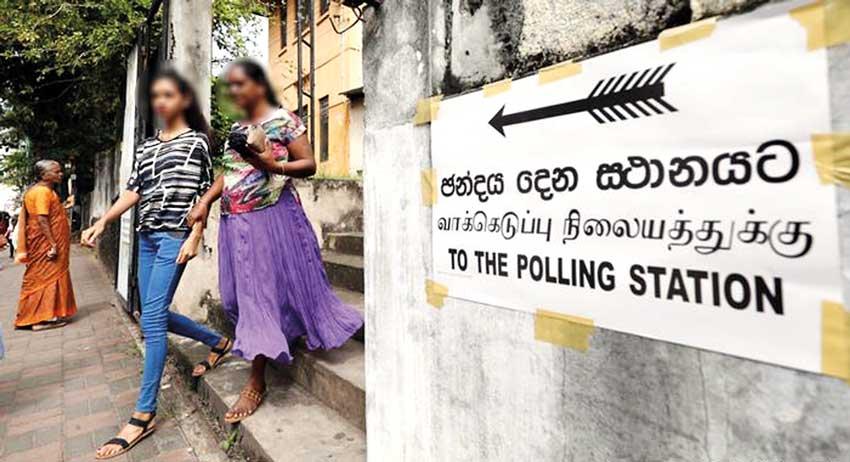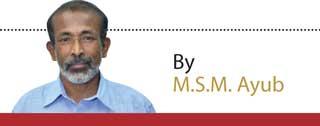14 Jan 2022 - {{hitsCtrl.values.hits}}

The decision to postpone the elections was taken last month and State Minister for Provincial Councils and Local Government Roshan Ranasinghe said on December 19 it was the COVID 19 situation that prompted the Government to take the decision
The previous UNP-led Government let the Local Government, as well as the Provincial Council elections, be deferred through technical issues emanating from changes introduced to the relevant election laws, especially the necessity for a delimitation process
 Public Services, Provincial Councils and Local Government Minister Janaka Bandara Thennakoon has not given, as he is not legally required to, any reason for the term extension of local government bodies, till March 19, next year.
Public Services, Provincial Councils and Local Government Minister Janaka Bandara Thennakoon has not given, as he is not legally required to, any reason for the term extension of local government bodies, till March 19, next year.
The Gazette notification that was issued on Monday (January 10) gives only the legal provisions under which the Minister is empowered to postpone the elections that were scheduled to be held before February 10, this year.
Sagara Kariyawasam, the General Secretary of the ruling Sri Lanka Podujana Peramuna (SLPP) had said that elections for 24 Municipal Councils, 41 Urban Councils and 274 Pradeshiya Sabhas were postponed in order to take time to revise the relevant election laws which he had said is very complex and confusing.
The decision to postpone the elections was taken last month and State Minister for Provincial Councils and Local Government Roshan Ranasinghe said on December 19 it was the COVID 19 situation that prompted the Government to take the decision.
The number of conflicting reasons that has been and are still being given leads one to conclude that the decision on this important matter has not been taken after it being debated at least within the ruling party, leave alone seeking the consent of the main Opposition parties.
It also prompts one to believe the allegation by the Opposition that the Government is hesitant to hold any election at this juncture for fear of being defeated.
This is an allegation that had rightly been thrown at the previous Government by the SLPP and has now been ironically boomeranged.
The only difference is that the previous UNP-led Government let the Local Government, as well as the Provincial Council elections, be deferred through technical issues emanating from changes introduced to the relevant election laws, especially the necessity for a delimitation process. The delimitation process for the Provincial Councils has not been finalised yet since 2017. This time the Minister has directly “extended the term of office of the members” of the Local Government bodies, without using such technical or legal tactics.
Kariyawasam might cite the Parliamentary Select Committee headed by Mahajana Eksatha Peramuna (MEP) leader and Education Minister Dinesh Gunawardena to reform the electoral system if one questioned him as to whether any mechanism for the revision of relevant laws before March 19 next year is in place.
However, Minister Gunawardena who is also the Leader of the House told Parliament of December 10 that the report of the committee was being prepared and the term of the committee which was scheduled to expire on January 16 (next Sunday) has been extended up to March 31, this year. Therefore one can expect the report to be presented in Parliament in about two months.
Even if the Parliamentary Select Committee recommends the mixed electoral system or the First-Past-the-Post system, the Government can hold the Local Government election in May or June this year, as the delimitation process for the Local Government bodies has already been completed. Why should then the Government postpone the elections till March next year?
The COVID 19 situation, another reason cited by the majority of the ruling party leaders for the deferral of the LG polls also seems to be illogical based on their previous arguments. It must be recalled while imposing a one-month police curfew throughout the country in March 2020 in the light of the COVID 19 patients having been detected in the country, the SLPP government wanted to hold the Parliamentary election on April 25, as scheduled.
When the Elections Commission on March 19, 2020, put off the Parliamentary election indefinitely, Prime Minister Mahinda Rajapaksa argued that the Commission did not have the authority to postpone elections.
However, now that the government offices and the schools are functioning normally, the ruling SLPP leaders are arguing that the LG elections have been put off due to the pandemic threat.
Once the late Rohana Wijeweera, the founder leader of the Janatha Vimukthi Peramuna (JVP) said that time always serves the Opposition in a country with a capitalist economy.
He argued that the popularity of any ruling party in a capitalist country would go down day in and day out, with the failure of the ruling party to solve the problems faced by the people. And this would be beneficial to the Opposition.
The previous Government did not realise this and let the delimitation process for the LG elections drag on, apparently in fear of facing the elections.
This resulted in the postponement of the elections which were to be held in 2015 and 2016 till February 2018. Prime Minister Ranil Wickremesinghe’s Government, apart from postponing the Local Government elections also wanted to defer the Provincial Council elections as well.
It first presented a Bill under the title of the 20th Amendment to the Constitution to hold elections to all nine provincial councils on the same day, without holding them on a staggered basis.
When the Supreme Court ruled that some of the Articles of the Bill have to be removed as they would lead to postponement of elections for some councils, they dumped the Bill altogether and presented an amendment to another Bill, the Provincial Council Elections Amendment Bill in order to introduce the mixed electoral system.
It was clear that it was presented as an amendment to a Bill during the committee stage of the debate on the latter in Parliament in order to circumvent the perusal of it by the Supreme Court which might have again seen it as an attempt to postpone the elections. It was this unethical act by the previous Government that the Provincial Council elections have been stalled until now, since 2017.
Contrary to the hesitation to hold elections by the UNP leaders there was a possibility for the party to win the majority of Local Councils or narrow the gap between it and the SLPP, had the election been held soon after the Parliamentary election in 2015.
It might have sometimes caused a chain reaction by impacting the provincial council elections and thereby the last general election as well, at least to some extent.
The UNP realised its folly only after the SLPP won 239 out of 341 Local Government bodies at the election held on February 10, 2018. It became a trendsetter which culminated in the SLPP coming to office.
This is a lesson for the SLPP as well which is attempting to hide behind various silly reasons after putting off the LG elections. Had it attributed the deferral to the financial hardship that the Government is currently faced with, it would have been seen much rational.
A ruling party may legally have the right and the authority to postpone elections, but not ethically. The decision should have been taken after consulting the main Opposition parties and the National Election Commission, as the elections must be held on a level playing field.
28 Nov 2024 46 minute ago
28 Nov 2024 2 hours ago
28 Nov 2024 2 hours ago
28 Nov 2024 3 hours ago
28 Nov 2024 4 hours ago